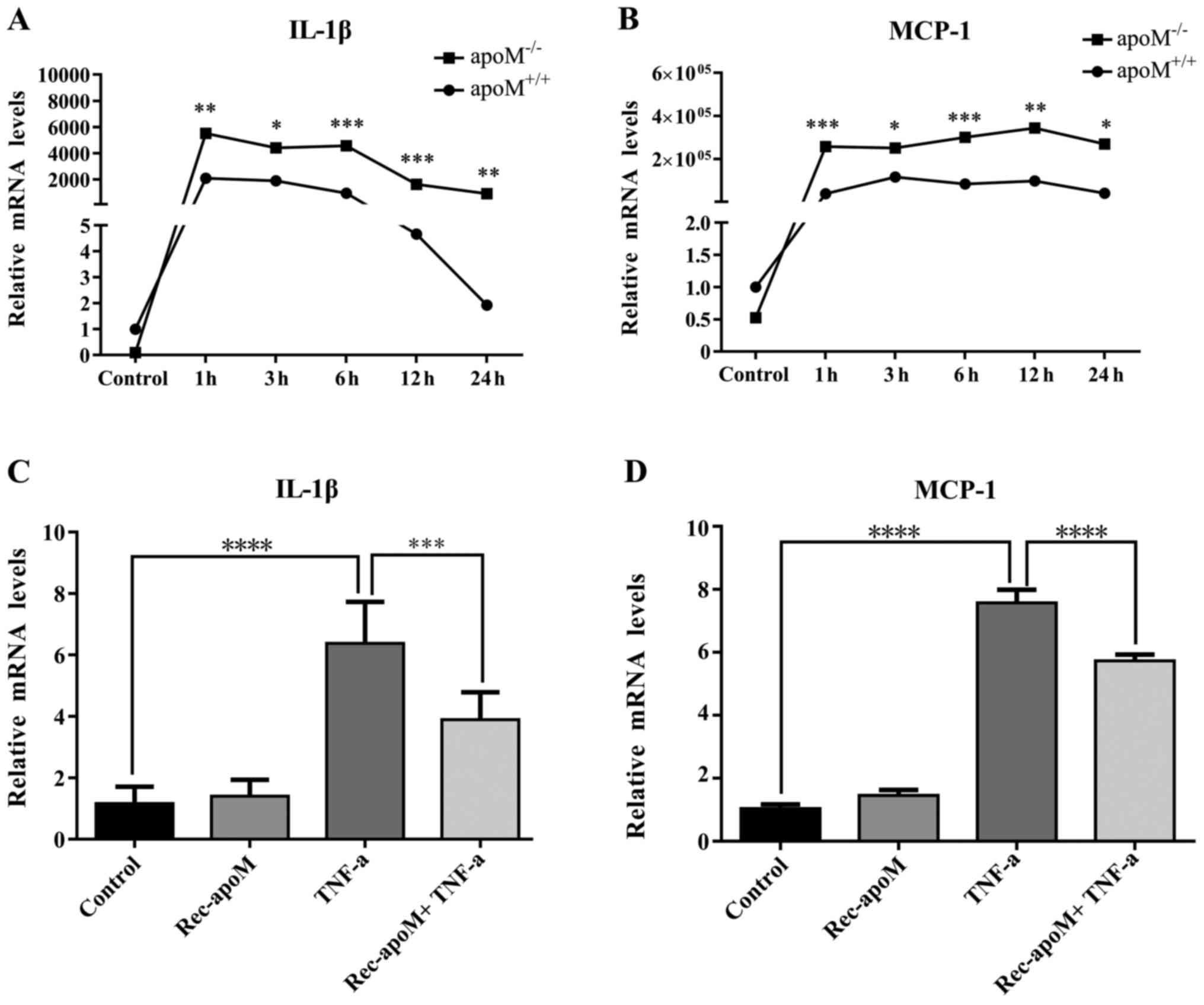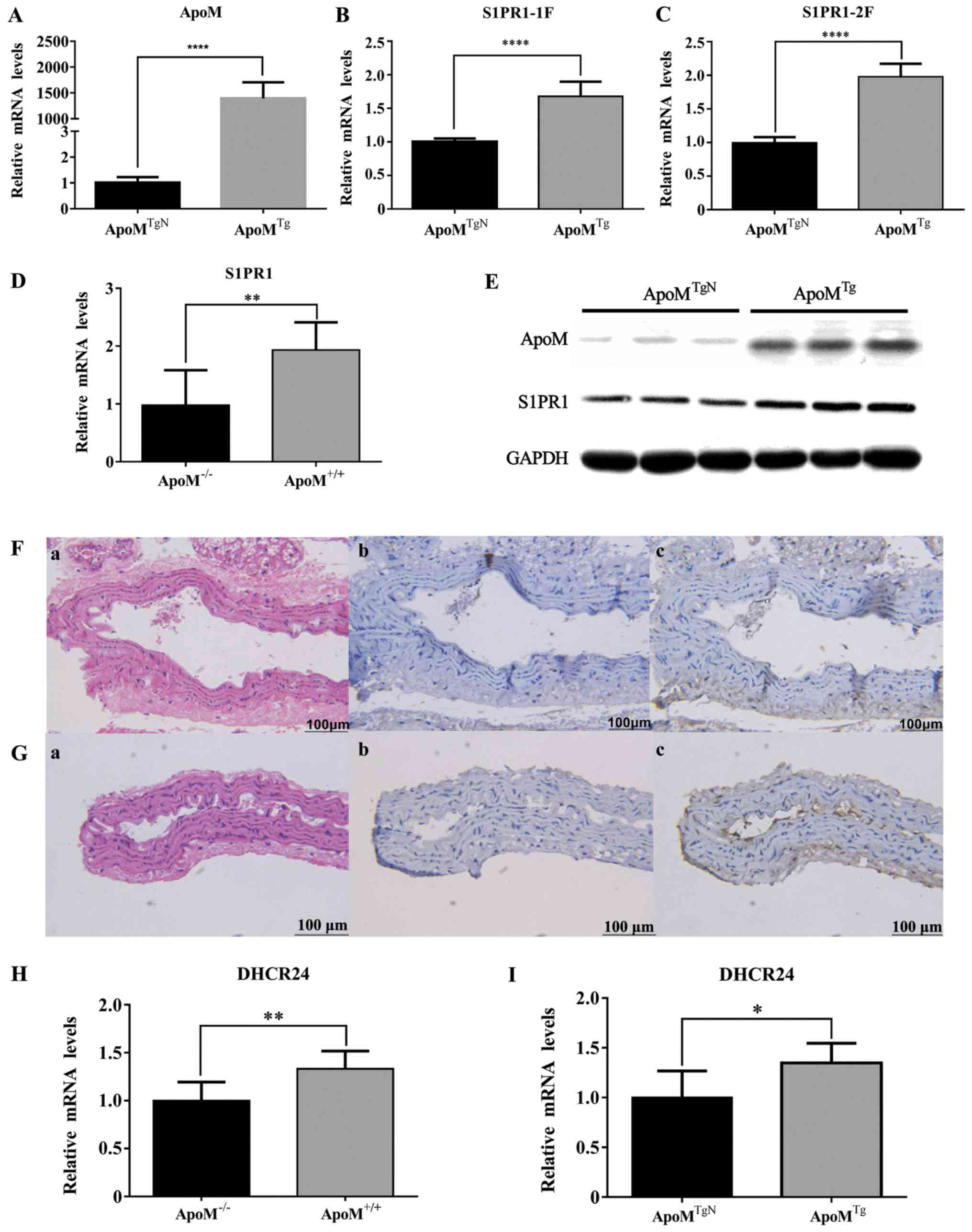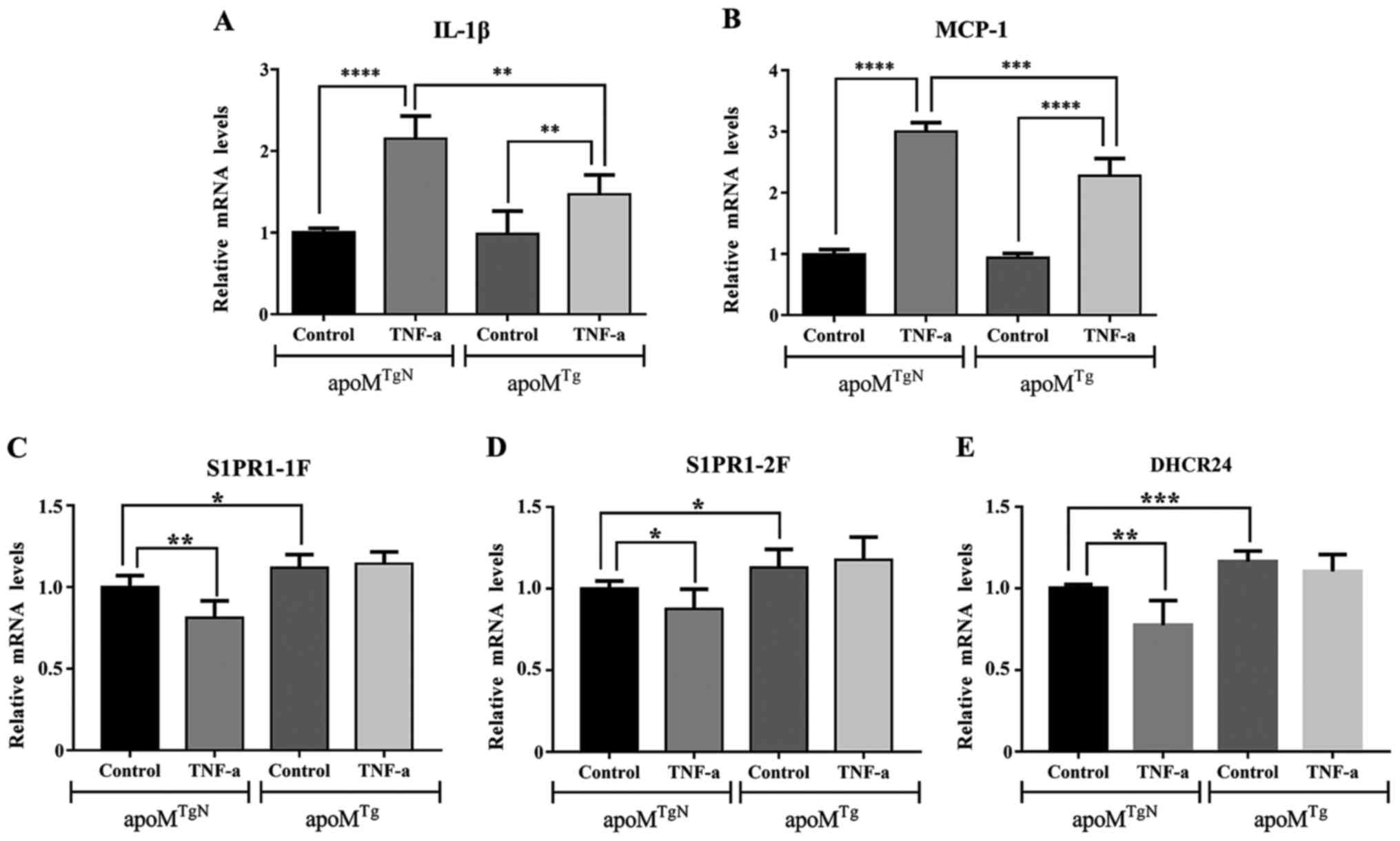|
1
|
Tall AR: An overview of reverse
cholesterol transport. Eur Heart J. 19 Suppl A:A31–A35.
1998.PubMed/NCBI
|
|
2
|
Feig JE, Shamir R and Fisher EA:
Atheroprotective effects of HDL: Beyond reverse cholesterol
transport. Curr Drug Targets. 9:196–203. 2008. View Article : Google Scholar : PubMed/NCBI
|
|
3
|
Xu N and Dahlbäck B: A novel human
apolipoprotein (apoM). J Biol Chem. 274:31286–31290. 1999.
View Article : Google Scholar : PubMed/NCBI
|
|
4
|
Huang XS, Zhao SP, Hu M and Luo YP:
Apolipoprotein M likely extends its anti-atherogenesis via
anti-inflammation. Med Hypotheses. 69:136–140. 2007. View Article : Google Scholar : PubMed/NCBI
|
|
5
|
Arkensteijn BW, Berbée JF, Rensen PC,
Nielsen LB and Christoffersen C: The apolipoprotein
m-sphingosine-1-phosphate axis: Biological relevance in lipoprotein
metabolism, lipid disorders and atherosclerosis. Int J Mol Sci.
14:4419–4431. 2013. View Article : Google Scholar : PubMed/NCBI
|
|
6
|
Ishii I, Fukushima N, Ye X and Chun J:
Lysophospholipid receptors: Signaling and biology. Annu Rev
Biochem. 73:321–354. 2004. View Article : Google Scholar : PubMed/NCBI
|
|
7
|
Potì F, Simoni M and Nofer JR:
Atheroprotective role of high-density lipoprotein (HDL)-associated
sphingosine-1-phosphate (S1P). Cardiovasc Res. 103:395–404. 2014.
View Article : Google Scholar : PubMed/NCBI
|
|
8
|
De Palma C, Meacci E, Perrotta C, Bruni P
and Clementi E: Endothelial nitric oxide synthase activation by
tumor necrosis factor alpha through neutral sphingomyelinase 2,
sphingosine kinase 1, and sphingosine 1 phosphate receptors: A
novel pathway relevant to the pathophysiology of endothelium.
Arterioscler Thromb Vasc Biol. 26:99–105. 2006. View Article : Google Scholar : PubMed/NCBI
|
|
9
|
Christoffersen C, Obinata H, Kumaraswamy
SB, Galvani S, Ahnström J, Sevvana M, Egerer-Sieber C, Muller YA,
Hla T, Nielsen LB and Dahlbäck B: Endothelium-protective
sphingosine-1-phosphate provided by HDL-associated apolipoprotein
M. Proc Natl Acad Sci USA. 108:9613–9618. 2011. View Article : Google Scholar : PubMed/NCBI
|
|
10
|
Zerenturk EJ, Sharpe LJ, Ikonen E and
Brown AJ: Desmosterol and DHCR24: Unexpected new directions for a
terminal step in cholesterol synthesis. Prog Lipid Res. 52:666–680.
2013. View Article : Google Scholar : PubMed/NCBI
|
|
11
|
McGrath KC, Li XH, Puranik R, Liong EC,
Tan JT, Dy VM, DiBartolo BA, Barter PJ, Rye KA and Heather AK: Role
of 3beta-hydroxysteroid-delta 24 reductase in mediating
antiinflammatory effects of high-density lipoproteins in
endothelial cells. Arterioscler Thromb Vasc Biol. 29:877–882. 2009.
View Article : Google Scholar : PubMed/NCBI
|
|
12
|
Wei J, Shi Y, Zhang X, Feng Y, Luo G,
Zhang J, Mu Q, Tang Y, Yu Y, Pan L, et al: Estrogen upregulates
hepatic apolipoprotein M expression via the estrogen receptor.
Biochim Biophys Acta. 1811:1146–1151. 2011. View Article : Google Scholar : PubMed/NCBI
|
|
13
|
Benvenuti S, Luciani P, Vannelli GB,
Gelmini S, Franceschi E, Serio M and Peri A: Estrogen and selective
estrogen receptor modulators exert neuroprotective effects and
stimulate the expression of selective Alzheimer's disease
indicator-1, a recently discovered antiapoptotic gene, in human
neuroblast long-term cell cultures. J Clin Endocrinol Metab.
90:1775–1782. 2005. View Article : Google Scholar : PubMed/NCBI
|
|
14
|
Nofer JR and van Eck M: HDL scavenger
receptor class B type I and platelet function. Curr Opin Lipidol.
22:277–282. 2011. View Article : Google Scholar : PubMed/NCBI
|
|
15
|
Pei Y, Chen X, Aboutouk D, Fuller MT,
Dadoo O, Yu P, White EJ, Igdoura SA and Trigatti BL: SR-BI in bone
marrow derived cells protects mice from diet induced coronary
artery atherosclerosis and myocardial infarction. PLoS One.
8:e724922013. View Article : Google Scholar : PubMed/NCBI
|
|
16
|
Tao H, Yancey PG, Babaev VR, Blakemore JL,
Zhang Y, Ding L, Fazio S and Linton MF: Macrophage SR-BI mediates
efferocytosis via Src/PI3K/Rac1 signaling and reduces
atherosclerotic lesion necrosis. J Lipid Res. 56:1449–1460. 2015.
View Article : Google Scholar : PubMed/NCBI
|
|
17
|
Linton MF, Tao H, Linton EF and Yancey PG:
SR-BI: A multifunctional receptor in cholesterol homeostasis and
atherosclerosis. Trends Endocrinol Metab. 28:461–472. 2017.
View Article : Google Scholar : PubMed/NCBI
|
|
18
|
Pan B, Ma Y, Ren H, He Y, Wang Y, Lv X,
Liu D, Ji L, Yu B, Wang Y, et al: Diabetic HDL is dysfunctional in
stimulating endothelial cell migration and proliferation due to
down regulation of SR-BI expression. PLoS One. 7:e485302012.
View Article : Google Scholar : PubMed/NCBI
|
|
19
|
van Wijk DF, Stroes ES and Dallinga-Thie
GM: Novel insights into anti-inflammatory actions of HDL.
Atherosclerosis. 212:388–389. 2010. View Article : Google Scholar : PubMed/NCBI
|
|
20
|
Zhang QH, Zu XY, Cao RX, Liu JH, Mo ZC,
Zeng Y, Li YB, Xiong SL, Liu X, Liao DF and Yi GH: An involvement
of SR-B1 mediated PI3K-Akt-eNOS signaling in HDL-induced
cyclooxygenase 2 expression and prostacyclin production in
endothelial cells. Biochem Biophys Res Commun. 420:17–23. 2012.
View Article : Google Scholar : PubMed/NCBI
|
|
21
|
Yuhanna IS, Zhu Y, Cox BE, Hahner LD,
Osborne-Lawrence S, Lu P, Marcel YL, Anderson RG, Mendelsohn ME,
Hobbs HH and Shaul PW: High-density lipoprotein binding to
scavenger receptor-BI activates endothelial nitric oxide synthase.
Nat Med. 7:853–857. 2001. View
Article : Google Scholar : PubMed/NCBI
|
|
22
|
Lee MH, Appleton KM, El-Shewy HM,
Sorci-Thomas MG, Thomas MJ, Lopes-Virella MF, Luttrell LM, Hammad
SM and Klein RL: S1P in HDL promotes interaction between SR-BI and
S1PR1 and activates S1PR1-mediated biological functions: Calcium
flux and S1PR1 internalization. J Lipid Res. 58:325–338. 2017.
View Article : Google Scholar : PubMed/NCBI
|
|
23
|
Wang Z, Luo G, Feng Y, Zheng L, Liu H,
Liang Y, Liu Z, Shao P, Berggren-Söderlund M, Zhang X and Xu N:
Decreased splenic CD4(+) T-lymphocytes in apolipoprotein M gene
deficient mice. Biomed Res Int. 2015:2935122015. View Article : Google Scholar : PubMed/NCBI
|
|
24
|
Livak KJ and Schmittgen TD: Analysis of
relative gene expression data using real-time quantitative PCR and
the 2(-Delta Delta C(T)) method. Methods. 25:402–408. 2001.
View Article : Google Scholar : PubMed/NCBI
|
|
25
|
Christoffersen C, Jauhiainen M, Moser M,
Porse B, Ehnholm C, Boesl M, Dahlbäck B and Nielsen LB: Effect of
apolipoprotein M on high density lipoprotein metabolism and
atherosclerosis in low density lipoprotein receptor knock-out mice.
J Biol Chem. 283:1839–1847. 2008. View Article : Google Scholar : PubMed/NCBI
|
|
26
|
Zheng L, Luo G, Zhang J, Mu Q, Shi Y,
Berggren-Söderlund M, Nilsson-Ehle P, Zhang X and Xu N: Decreased
activities of apolipoprotein m promoter are associated with the
susceptibility to coronary artery diseases. Int J Med Sci.
11:365–372. 2014. View Article : Google Scholar : PubMed/NCBI
|
|
27
|
Thacker SG, Zarzour A, Chen Y, Alcicek MS,
Freeman LA, Sviridov DO, Demosky SJ Jr and Remaley AT: High-density
lipoprotein reduces inflammation from cholesterol crystals by
inhibiting inflammasome activation. Immunology. 149:306–319. 2016.
View Article : Google Scholar : PubMed/NCBI
|
|
28
|
Wolfrum C, Poy MN and Stoffel M:
Apolipoprotein M is required for prebeta-HDL formation and
cholesterol efflux to HDL and protects against atherosclerosis. Nat
Med. 11:418–422. 2005. View
Article : Google Scholar : PubMed/NCBI
|
|
29
|
Mulya A, Seo J, Brown AL, Gebre AK,
Boudyguina E, Shelness GS and Parks JS: Apolipoprotein M expression
increases the size of nascent pre beta HDL formed by ATP binding
cassette transporter A1. J Lipid Res. 51:514–524. 2010. View Article : Google Scholar : PubMed/NCBI
|
|
30
|
Ren K, Tang ZL, Jiang Y, Tan YM and Yi GH:
Apolipoprotein M. Clin Chim Acta. 446:21–29. 2015. View Article : Google Scholar : PubMed/NCBI
|
|
31
|
Kumaraswamy SB, Linder A, Åkesson P and
Dahlbäck B: Decreased plasma concentrations of apolipoprotein M in
sepsis and systemic inflammatory response syndromes. Crit Care.
16:R602012. View Article : Google Scholar : PubMed/NCBI
|
|
32
|
Christoffersen C and Nielsen LB:
Apolipoprotein M-a new biomarker in sepsis. Crit Care. 16:1262012.
View Article : Google Scholar : PubMed/NCBI
|
|
33
|
Feingold KR, Shigenaga JK, Chui LG, Moser
A, Khovidhunkit W and Grunfeld C: Infection and inflammation
decrease apolipoprotein M expression. Atherosclerosis. 199:19–26.
2008. View Article : Google Scholar : PubMed/NCBI
|
|
34
|
Gao JJ, Hu YW, Wang YC, Sha YH, Ma X, Li
SF, Zhao JY, Lu JB, Huang C, Zhao JJ, et al: ApoM Suppresses
TNF-α-Induced Expression of ICAM-1 and VCAM-1 Through Inhibiting
the Activity of NF-κB. DNA Cell Biol. 34:550–556. 2015. View Article : Google Scholar : PubMed/NCBI
|
|
35
|
Leyva-López N, Gutierrez-Grijalva EP,
Ambriz-Perez DL and Heredia JB: Flavonoids as cytokine modulators:
A possible therapy for inflammation-related diseases. Int J Mol
Sci. 17(pii): E9212016. View Article : Google Scholar : PubMed/NCBI
|
|
36
|
Khan R, Spagnoli V, Tardif JC and L'Allier
PL: Novel anti-inflammatory therapies for the treatment of
atherosclerosis. Atherosclerosis. 240:497–509. 2015. View Article : Google Scholar : PubMed/NCBI
|
|
37
|
Galea J, Armstrong J, Gadsdon P, Holden H,
Francis SE and Holt CM: Interleukin-1 beta in coronary arteries of
patients with ischemic heart disease. Arterioscler Thromb Vasc
Biol. 16:1000–1006. 1996. View Article : Google Scholar : PubMed/NCBI
|
|
38
|
Freitas Lima LC, Braga VA, do Socorro de
França Silva M, Cruz JC, Sousa Santos SH, de Oliveira Monteiro MM
and Balarini CM: Adipokines, diabetes and atherosclerosis: An
inflammatory association. Front Physiol. 6:3042015. View Article : Google Scholar : PubMed/NCBI
|
|
39
|
Stephen SL, Freestone K, Dunn S, Twigg MW,
Homer-Vanniasinkam S, Walker JH, Wheatcroft SB and Ponnambalam S:
Scavenger receptors and their potential as therapeutic targets in
the treatment of cardiovascular disease. Int J Hypertens.
2010:6469292010. View Article : Google Scholar : PubMed/NCBI
|
|
40
|
Nádró B, Juhász L, Szentpéteri A, Páll D,
Paragh G and Harangi M: The role of apolipoprotein M and
sphingosine 1-phosphate axis in the prevention of atherosclerosis.
Orv Hetil. 159:168–175. 2018.(In Hungarian). View Article : Google Scholar : PubMed/NCBI
|
|
41
|
Guo S, Yu Y, Zhang N, Cui Y, Zhai L, Li H,
Zhang Y, Li F, Kan Y and Qin S: Higher level of plasma bioactive
molecule sphingosine 1-phosphate in women is associated with
estrogen. Biochim Biophys Acta. 1841:836–846. 2014. View Article : Google Scholar : PubMed/NCBI
|
|
42
|
Sutter I, Park R, Othman A, Rohrer L,
Hornemann T, Stoffel M, Devuyst O and von Eckardstein A:
Apolipoprotein M modulates erythrocyte efflux and tubular
reabsorption of sphingosine-1-phosphate. J Lipid Res. 55:1730–1737.
2014. View Article : Google Scholar : PubMed/NCBI
|
|
43
|
Igarashi J, Erwin PA, Dantas AP, Chen H
and Michel T: VEGF induces S1P1 receptors in endothelial cells:
Implications for cross-talk between sphingolipid and growth factor
receptors. Proc Natl Acad Sci USA. 100:10664–10669. 2003.
View Article : Google Scholar : PubMed/NCBI
|
|
44
|
Nofer JR, van der Giet M, Tölle M,
Wolinska I, von Wnuck Lipinski K, Baba HA, Tietge UJ, Gödecke A,
Ishii I, Kleuser B, et al: HDL induces NO-dependent vasorelaxation
via the lysophospholipid receptor S1P3. J Clin Invest. 113:569–581.
2004. View Article : Google Scholar : PubMed/NCBI
|
|
45
|
Wang X and Wang F: Vascular protection by
high-density lipoprotein-associated sphingosine-1-phosphate. J
Geriatr Cardiol. 14:696–702. 2017.PubMed/NCBI
|
|
46
|
Brinck JW, Thomas A, Brulhart-Meynet MC,
Lauer E, Frej C, Dahlbäck B, Stenvinkel P, James RW and Frias MA:
High-density lipoprotein from end-stage renal disease patients
exhibits superior cardioprotection and increase in
sphingosine-1-phosphate. Eur J Clin Invest. 48:e128662018.
View Article : Google Scholar
|
|
47
|
Ruiz M, Okada H and Dahlbäck B:
HDL-associated ApoM is anti-apoptotic by delivering sphingosine
1-phosphate to S1P1 & S1P3 receptors on vascular endothelium.
Lipids Health Dis. 16:362017. View Article : Google Scholar : PubMed/NCBI
|
|
48
|
Feuerborn R, Becker S, Potì F, Nagel P,
Brodde M, Schmidt H, Christoffersen C, Ceglarek U, Burkhardt R and
Nofer JR: High density lipoprotein (HDL)-associated sphingosine
1-phosphate (S1P) inhibits macrophage apoptosis by stimulating
STAT3 activity and survivin expression. Atherosclerosis. 257:29–37.
2017. View Article : Google Scholar : PubMed/NCBI
|
|
49
|
Bosteen MH, Madsen Svarrer EM, Bisgaard
LS, Martinussen T, Madsen M, Nielsen LB, Christoffersen C and
Pedersen TX: Effects of apolipoprotein M in uremic atherosclerosis.
Atherosclerosis. 265:93–101. 2017. View Article : Google Scholar : PubMed/NCBI
|
|
50
|
Frej C, Mendez AJ, Ruiz M, Castillo M,
Hughes TA, Dahlbäck B and Goldberg RB: A shift in ApoM/S1P between
HDL-particles in women with type 1 diabetes mellitus is associated
with impaired anti-inflammatory effects of the ApoM/S1P complex.
Arterioscler Thromb Vasc Biol. 37:1194–1205. 2017. View Article : Google Scholar : PubMed/NCBI
|
|
51
|
Memon AA, Sundquist J, Zöller B, Wang X,
Dahlbäck B, Svensson PJ and Sundquist K: Apolipoprotein M and the
risk of unprovoked recurrent venous thromboembolism. Thromb Res.
133:322–326. 2014. View Article : Google Scholar : PubMed/NCBI
|
|
52
|
Ahmad A, Sundquist K, Zöller B, Dahlbäck
B, Elf J, Svensson PJ, Strandberg K, Sundquist J and Memon AA:
Evaluation of expression level of apolipoprotein M as a diagnostic
marker for primary venous thromboembolism. Clin Appl Thromb Hemost.
24:416–422. 2018. View Article : Google Scholar : PubMed/NCBI
|
|
53
|
Hajny S and Christoffersen C: A novel
perspective on the ApoM-S1P axis, highlighting the metabolism of
ApoM and its role in liver fibrosis and neuroinflammation. Int J
Mol Sci. 18(pii): E16362017. View Article : Google Scholar : PubMed/NCBI
|
|
54
|
Christensen PM, Liu CH, Swendeman SL,
Obinata H, Qvortrup K, Nielsen LB, Hla T, Di Lorenzo A and
Christoffersen C: Impaired endothelial barrier function in
apolipoprotein M-deficient mice is dependent on
sphingosine-1-phosphate receptor 1. FASEB J. 30:2351–2359. 2016.
View Article : Google Scholar : PubMed/NCBI
|
|
55
|
Ruiz M, Frej C, Holmér A, Guo LJ, Tran S
and Dahlbäck B: High-density lipoprotein-associated apolipoprotein
M limits endothelial inflammation by delivering
sphingosine-1-phosphate to the sphingosine-1-phosphate receptor 1.
Arterioscler Thromb Vasc Biol. 37:118–129. 2017. View Article : Google Scholar : PubMed/NCBI
|
|
56
|
Zhu B, Luo GH, Feng YH, Yu MM, Zhang J,
Wei J, Yang C, Xu N and Zhang XY: Apolipoprotein M protects against
lipopolysaccharide-induced acute lung injury via
sphingosine-1-phosphate signaling. Inflammation. 41:643–653. 2018.
View Article : Google Scholar : PubMed/NCBI
|
|
57
|
Patel S, Di Bartolo BA, Nakhla S, Heather
AK, Mitchell TW, Jessup W, Celermajer DS, Barter PJ and Rye KA:
Anti-inflammatory effects of apolipoprotein A-I in the rabbit.
Atherosclerosis. 212:392–397. 2010. View Article : Google Scholar : PubMed/NCBI
|
|
58
|
Wu BJ, Chen K, Shrestha S, Ong KL, Barter
PJ and Rye KA: High-density lipoproteins inhibit vascular
endothelial inflammation by increasing 3β-hydroxysteroid-Δ24
reductase expression and inducing heme oxygenase-1. Circ Res.
112:278–288. 2013. View Article : Google Scholar : PubMed/NCBI
|
|
59
|
Connelly MA, de la Llera-Moya M, Monzo P,
Yancey PG, Drazul D, Stoudt G, Fournier N, Klein SM, Rothblat GH
and Williams DL: Analysis of chimeric receptors shows that multiple
distinct functional activities of scavenger receptor, class B, type
I (SR-BI), are localized to the extracellular receptor domain.
Biochemistry. 40:5249–5259. 2001. View Article : Google Scholar : PubMed/NCBI
|
|
60
|
Banerjee S, de Freitas A, Friggeri A,
Zmijewski JW, Liu G and Abraham E: Intracellular HMGB1 negatively
regulates efferocytosis. J Immunol. 187:4686–4694. 2011. View Article : Google Scholar : PubMed/NCBI
|
|
61
|
Al-Jarallah A, Chen X, González L and
Trigatti BL: High density lipoprotein stimulated migration of
macrophages depends on the scavenger receptor class B type I, PDZK1
and Akt1 and is blocked by sphingosine 1 phosphate receptor
antagonists. PLoS One. 9:e1064872014. View Article : Google Scholar : PubMed/NCBI
|
|
62
|
Sahoo D, Peng Y, Smith JR, Darlington YF
and Connelly MA: Scavenger receptor class B, type I (SR-BI)
homo-dimerizes via its C-terminal region: Fluorescence resonance
energy transfer analysis. Biochim Biophys Acta. 1771:818–829. 2007.
View Article : Google Scholar : PubMed/NCBI
|



















